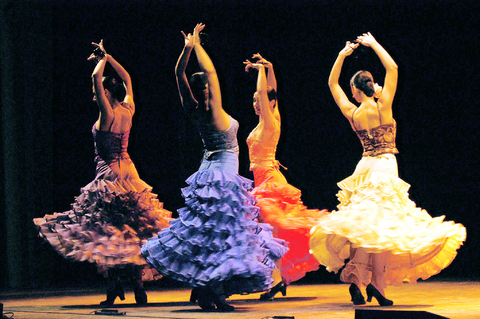Jose Greco Flamenco Dance Company wowed audiences on Friday night at the National Theater with shouting, leaping and a whole lot of stomping as they kicked off a weekend set of performances in Taipei with very energetic heels following a week-long tour of the island.
The first half of the show featured an anthology of Spanish dance.

Most of the pieces were ballet-inspired folk dances accompanied by the kind of canned orchestral music you might hear at the big top. Though the dances themselves were quite lively, perhaps more authentic music could have really brought out their folksy flavor.

PHOTOS COURTESY OF JOSE GRECO FLAMENCO DANCE COMPANY
Thankfully the live band did come out for Jose Greco's solo demonstration of the Serrana, a classic Andalusian form or palo of flamenco. All eyes were glued to Greco's fancy footwork from the first soulful strum of the guitar to Greco's final thundering stomp. With one cocky arm flung above his head, Greco gazed out over the awestruck audience. Applause erupted -- he had us just where he wanted us.
Possibly the only other highlight of the show's first half was when Carmela Greco, Jose's sister came out in a charcoal dress with a long ruffled train. Her dance, slow and stately, was punctuated by backward kicks to keep the dress' train in order, executed with the same haughtiness as if she were flinging long, flowing locks from her face.
The audience returned from intermission yearning for more of Jose Greco and that sultry guitar. They got it in the form of Los Tarantos, a Gitano Romeo and Juliet story adapted by Jose Greco to show off his and the company's skills. Greco played the pompous older peacock who claims the young beauty as his bride, and tries to tear her away from her lover. This was perfect for Greco, who used the vanity and machismo of his character as an excuse to treat the audience time and again to his jaw-dropping sequences of kicks and stomps.
Carmela, who played the matriarch, danced with the strength and sorrow of a woman weighed down by the world. Her slow, yet powerful movements provided a contrast to the wistful and frenetic dancing of the young lovers.
The confrontational scenes really brought out what might possibly be the true function of flamenco -- a glorified stomping contest.
These heated showdowns embodied the spirit of a genre that was born out of the pent-up frustration of persecuted peoples. The soulfulness of the Gitanos and the passion of the Moors combined centuries ago to produce the music and eventually the dance that became a symbol of Spanish national identity. On the stage Friday night, it became an expression of the fervent anger of desperate families.
Despite Greco's eye-popping moves, it was vocalist Gabarri Barrul Julio who really kept Los Tarantos going by inciting both the dancers and the audience to passion with his reverberating, melodic yells that sounded like an alternately furious and mournful call to prayer.
Meanwhile, the guitarists with their by turns gentle and violent strumming could have kept the audience rapt all by themselves.
By the end of it all, one was almost surprised that the dancers, musicians and their instruments didn't fall apart from exhaustion. But they were saving the best for the encore. As if the stage hadn't taken enough of a beating, the whole company came out stomping in unison.
Coaxed forward by Julio's impassioned hollering, each man took his turn freestyling with his best and wildest flamenco. Stomping their heels at lightning speed, kicking high in the air or shaking their entire bodies frenetically, these gentlemen were as much athletes as they were artists.
While female dancers in flowing skirts may be a symbol of the genre, the encore capped off a stirring demonstration of the fevered power that male dancers bring to Flamenco.
Jose Greco and his team spent enough energy out on that stage to keep the place heated up for a good chunk of the winter.

April 14 to April 20 In March 1947, Sising Katadrepan urged the government to drop the “high mountain people” (高山族) designation for Indigenous Taiwanese and refer to them as “Taiwan people” (台灣族). He considered the term derogatory, arguing that it made them sound like animals. The Taiwan Provincial Government agreed to stop using the term, stating that Indigenous Taiwanese suffered all sorts of discrimination and oppression under the Japanese and were forced to live in the mountains as outsiders to society. Now, under the new regime, they would be seen as equals, thus they should be henceforth

Last week, the the National Immigration Agency (NIA) told the legislature that more than 10,000 naturalized Taiwanese citizens from the People’s Republic of China (PRC) risked having their citizenship revoked if they failed to provide proof that they had renounced their Chinese household registration within the next three months. Renunciation is required under the Act Governing Relations Between the People of the Taiwan Area and the Mainland Area (臺灣地區與大陸地區人民關係條例), as amended in 2004, though it was only a legal requirement after 2000. Prior to that, it had been only an administrative requirement since the Nationality Act (國籍法) was established in

Three big changes have transformed the landscape of Taiwan’s local patronage factions: Increasing Democratic Progressive Party (DPP) involvement, rising new factions and the Chinese Nationalist Party’s (KMT) significantly weakened control. GREEN FACTIONS It is said that “south of the Zhuoshui River (濁水溪), there is no blue-green divide,” meaning that from Yunlin County south there is no difference between KMT and DPP politicians. This is not always true, but there is more than a grain of truth to it. Traditionally, DPP factions are viewed as national entities, with their primary function to secure plum positions in the party and government. This is not unusual

US President Donald Trump’s bid to take back control of the Panama Canal has put his counterpart Jose Raul Mulino in a difficult position and revived fears in the Central American country that US military bases will return. After Trump vowed to reclaim the interoceanic waterway from Chinese influence, US Defense Secretary Pete Hegseth signed an agreement with the Mulino administration last week for the US to deploy troops in areas adjacent to the canal. For more than two decades, after handing over control of the strategically vital waterway to Panama in 1999 and dismantling the bases that protected it, Washington has